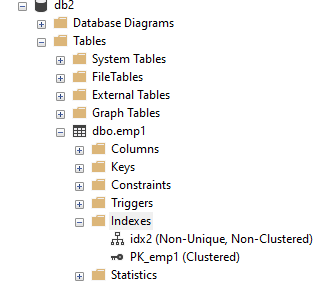suppose in db1 i have a emp1 table which has index and i have db2 and it has also emp1 table which has no index but same table structure. now i want to copy index from db1..emp1 to db2..emp1 and i tried below script which did not work but throw no error too.
the script i tried from here. https://stackoverflow.com/a/31858958/14631743
CREATE PROCEDURE [dbo].[spCloneDatabaseTableStructurev3]
@SourceDatabase nvarchar(max),
@SourceSchema nvarchar(max),
@SourceTable nvarchar(max),
@DestinationDatabase nvarchar(max),
@DestinationSchema nvarchar(max),
@DestinationTable nvarchar(max),
@RecreateIfExists bit = 0
AS
BEGIN
/*
Clones an existing table to another table (without data)
Optionally drops and re-creates target table
Copies:
* Structure
* Primary key
* Indexes (including ASC/DESC, included columns, filters)
* Constraints (and unique constraints)
DOES NOT copy:
* Triggers
* File groups
* Probably a lot of other things
Note: Assumes that you name (unique) constraints with the table name in it (in order to not duplicate constraint names)
*/
declare @sql nvarchar(max)
SET NOCOUNT ON;
BEGIN TRANSACTION
set @sql = '
declare @RecreateIfExists bit = ' + convert(varchar(max),@RecreateIfExists) + '
--drop the table
if EXISTS (SELECT * FROM [' + @DestinationDatabase + '].INFORMATION_SCHEMA.TABLES WHERE TABLE_SCHEMA = ''' + @DestinationSchema + ''' AND TABLE_NAME = ''' + @DestinationTable + ''')
BEGIN
if @RecreateIfExists = 1
BEGIN
DROP TABLE [' + @DestinationDatabase + '].[' + @DestinationSchema + '].[' + @DestinationTable + ']
END
ELSE
RETURN
END
--create the table
SELECT TOP (0) * INTO [' + @DestinationDatabase + '].[' + @DestinationSchema + '].[' + @DestinationTable + '] FROM [' + @SourceDatabase + '].[' + @SourceSchema + '].[' + @SourceTable + ']
DECLARE @PKSchema nvarchar(255), @PKName nvarchar(255)
SELECT TOP 1 @PKSchema = CONSTRAINT_SCHEMA, @PKName = CONSTRAINT_NAME FROM [' + @SourceDatabase + '].INFORMATION_SCHEMA.TABLE_CONSTRAINTS WHERE TABLE_SCHEMA = ''' + @SourceSchema + ''' AND TABLE_NAME = ''' + @SourceTable + ''' AND CONSTRAINT_TYPE = ''PRIMARY KEY''
--create primary key
IF NOT @PKSchema IS NULL AND NOT @PKName IS NULL
BEGIN
DECLARE @PKColumns nvarchar(MAX)
SET @PKColumns = ''''
SELECT @PKColumns = @PKColumns + ''['' + COLUMN_NAME + ''],''
FROM [' + @SourceDatabase + '].INFORMATION_SCHEMA.KEY_COLUMN_USAGE
where TABLE_NAME = ''' + @SourceTable + ''' and TABLE_SCHEMA = ''' + @SourceSchema + ''' AND CONSTRAINT_SCHEMA = @PKSchema AND CONSTRAINT_NAME= @PKName
ORDER BY ORDINAL_POSITION
SET @PKColumns = LEFT(@PKColumns, LEN(@PKColumns) - 1)
exec(''ALTER TABLE [' + @DestinationDatabase + '].[' + @DestinationSchema + '].[' + @DestinationTable + '] ADD CONSTRAINT [PK_' + @DestinationTable + '] PRIMARY KEY CLUSTERED ('' + @PKColumns + '')'')
END
--create other indexes
DECLARE @IndexId int, @IndexName nvarchar(255), @IsUnique bit, @IsUniqueConstraint bit, @FilterDefinition nvarchar(max)
DECLARE indexcursor CURSOR FOR
SELECT index_id, name, is_unique, is_unique_constraint, filter_definition FROM sys.indexes WHERE type = 2 and object_id = object_id(''[' + @SourceSchema + '].[' + @SourceTable + ']'')
OPEN indexcursor;
FETCH NEXT FROM indexcursor INTO @IndexId, @IndexName, @IsUnique, @IsUniqueConstraint, @FilterDefinition;
WHILE @@FETCH_STATUS = 0
BEGIN
DECLARE @Unique nvarchar(255)
SET @Unique = CASE WHEN @IsUnique = 1 THEN '' UNIQUE '' ELSE '''' END
DECLARE @KeyColumns nvarchar(max), @IncludedColumns nvarchar(max)
SET @KeyColumns = ''''
SET @IncludedColumns = ''''
select @KeyColumns = @KeyColumns + ''['' + c.name + ''] '' + CASE WHEN is_descending_key = 1 THEN ''DESC'' ELSE ''ASC'' END + '','' from sys.index_columns ic
inner join sys.columns c ON c.object_id = ic.object_id and c.column_id = ic.column_id
where index_id = @IndexId and ic.object_id = object_id(''[' + @SourceSchema + '].[' + @SourceTable + ']'') and key_ordinal > 0
order by index_column_id
select @IncludedColumns = @IncludedColumns + ''['' + c.name + ''],'' from sys.index_columns ic
inner join sys.columns c ON c.object_id = ic.object_id and c.column_id = ic.column_id
where index_id = @IndexId and ic.object_id = object_id(''[' + @SourceSchema + '].[' + @SourceTable + ']'') and key_ordinal = 0
order by index_column_id
IF LEN(@KeyColumns) > 0
SET @KeyColumns = LEFT(@KeyColumns, LEN(@KeyColumns) - 1)
IF LEN(@IncludedColumns) > 0
BEGIN
SET @IncludedColumns = '' INCLUDE ('' + LEFT(@IncludedColumns, LEN(@IncludedColumns) - 1) + '')''
END
IF @FilterDefinition IS NULL
SET @FilterDefinition = ''''
ELSE
SET @FilterDefinition = ''WHERE '' + @FilterDefinition + '' ''
if @IsUniqueConstraint = 0
exec(''CREATE '' + @Unique + '' NONCLUSTERED INDEX ['' + @IndexName + ''] ON [' + @DestinationDatabase + '].[' + @DestinationSchema + '].[' + @DestinationTable + '] ('' + @KeyColumns + '')'' + @IncludedColumns + @FilterDefinition)
ELSE
BEGIN
SET @IndexName = REPLACE(@IndexName, ''' + @SourceTable + ''', ''' + @DestinationTable + ''')
exec(''ALTER TABLE [' + @DestinationDatabase + '].[' + @DestinationSchema + '].[' + @DestinationTable + '] ADD CONSTRAINT ['' + @IndexName + ''] UNIQUE NONCLUSTERED ('' + @KeyColumns + '')'')
END
FETCH NEXT FROM indexcursor INTO @IndexId, @IndexName, @IsUnique, @IsUniqueConstraint, @FilterDefinition;
END;
CLOSE indexcursor;
DEALLOCATE indexcursor;
--create constraints
DECLARE @ConstraintName nvarchar(max), @CheckClause nvarchar(max)
DECLARE constraintcursor CURSOR FOR
SELECT REPLACE(c.CONSTRAINT_NAME, ''' + @SourceTable + ''', ''' + @DestinationTable + '''), CHECK_CLAUSE from [' + @SourceDatabase + '].INFORMATION_SCHEMA.CONSTRAINT_TABLE_USAGE t
INNER JOIN [' + @SourceDatabase + '].INFORMATION_SCHEMA.CHECK_CONSTRAINTS c ON c.CONSTRAINT_SCHEMA = TABLE_SCHEMA AND c.CONSTRAINT_NAME = t.CONSTRAINT_NAME
WHERE TABLE_SCHEMA = ''' + @SourceSchema + ''' AND TABLE_NAME = ''' + @SourceTable + '''
OPEN constraintcursor;
FETCH NEXT FROM constraintcursor INTO @ConstraintName, @CheckClause;
WHILE @@FETCH_STATUS = 0
BEGIN
exec(''ALTER TABLE [' + @DestinationDatabase + '].[' + @DestinationSchema + '].[' + @DestinationTable + '] WITH CHECK ADD CONSTRAINT ['' + @ConstraintName + ''] CHECK '' + @CheckClause)
exec(''ALTER TABLE [' + @DestinationDatabase + '].[' + @DestinationSchema + '].[' + @DestinationTable + '] CHECK CONSTRAINT ['' + @ConstraintName + '']'')
FETCH NEXT FROM constraintcursor INTO @ConstraintName, @CheckClause;
END;
CLOSE constraintcursor;
DEALLOCATE constraintcursor;'
exec(@sql)
COMMIT TRANSACTION
END


